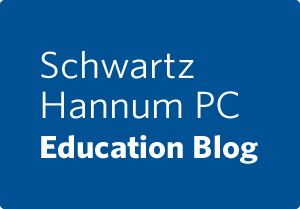By Sara Goldsmith Schwartz and Sarah H. Fay
Educational institutions, both secondary and higher ed, routinely survey peer institutions in order to ascertain the details of faculty and other employee compensation. In some cases, the data enables institutions to pay similar amounts as their peers; in others, the data enables institutions to pay more than market value. In both contexts, the purpose is to attract and retain excellent educators: a noble goal. However, before participating in (or relying upon data from) a compensation survey, educational institutions ought to consider the reality that some of these compensation survey methods may unwittingly violate antitrust laws.
Antitrust laws prohibit “anti-competitive” business practices – meaning joint conduct that unreasonably restrains competition. While not a per se violation, the exchange of information about compensation and benefits among employers is subject to antitrust scrutiny. Notably, compensation surveys that promote competition generally comply with antitrust laws.
At first blush, distinguishing the surveys that promote, rather than quash, competition may seem like a daunting task. The U.S. Department of Justice (“DOJ”) and the Federal Trade Commission (“FTC”), the agencies tasked with enforcing federal antitrust laws, have identified three criteria that, if present, will generally protect employers under the umbrella of an antitrust “safety zone.” These are: “(1) the survey is managed by a third party; (2) the information provided by survey participants is based on data more than three months old; and (3) there are at least five providers reporting data upon which each disseminated statistic is based, no individual provider’s data represents more than 25% of a weighted basis of that statistic, and any information disseminated is sufficiently aggregated such that it would not allow recipients to identify the prices paid by any particular provider.”
Of course, this is not a fool-proof method; a survey that meets this test may still violate antitrust laws. However, the DOJ and FTC have represented that, absent extraordinary circumstances, they will not challenge an employer that participates in a survey satisfying the safety zone criteria. Thus, the safety zone provides a useful framework to help schools navigate this complex area.
If an educational institution decides to conduct or utilize a survey sharing compensation information, the following tips may help minimize the risk of violating antitrust laws:
- Survey participants should not be identifiable, whether directly or indirectly.
- Prospective wages and benefits information should not be collected.
- Avoid including advice on how to use or interpret data. The more raw the data, the less likely it will be to raise antitrust concerns.
- Prohibit or avoid improper discussions about the survey. For instance, consider including a written disclaimer or an agreement that prohibits discussions that violate antitrust laws.
- In setting future compensation or benefits, the survey should be used as only one factor of many. This decision-making process should be carefully documented.
- Avoid conducting surveys too often, as the frequent collection of data could support an improper motive.
If you have any questions about best practices and legal compliance for conducting or participating in a compensation survey, please do not hesitate to contact a member of the Firm’s Education Practice Group.


